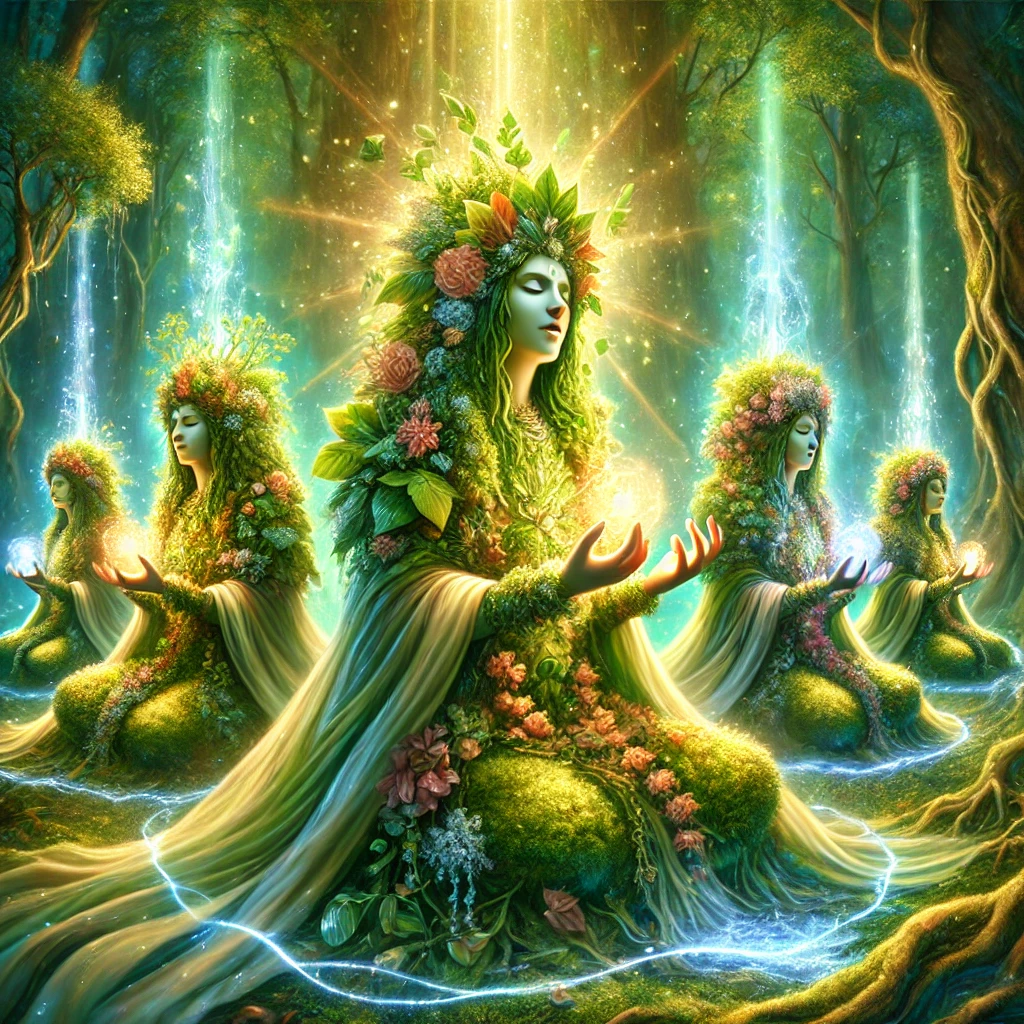Overview
Nature Devas are considered spiritual entities or forces of nature that preside over the growth and well-being of the natural world. They are intrinsic to various spiritual traditions, often visualized as vibrant, ethereal beings responsible for maintaining ecological balance and facilitating the healing of the Earth. The concept of Nature Devas bridges the gap between metaphysical beliefs and environmental stewardship, highlighting the deep connection between spiritual health and the health of our planet.
Roles and Functions
1. Guardians of the Natural Order
- Ecological Balance: Devas oversee the vital processes that sustain life in different ecosystems, from forests and oceans to mountains and meadows.
- Protectors of Wildlife: They ensure that animal and plant species thrive in harmony, safeguarding biodiversity and promoting symbiotic relationships.
2. Facilitators of Earth Healing
- Healing Damaged Land: Nature Devas are believed to aid in the recovery of landscapes that have suffered ecological damage due to pollution, deforestation, or other human activities.
- Restoration of Energetic Health: They work to cleanse and restore the subtle energies of the Earth, believed to be essential for both environmental and human health.
3. Connectors Between Humans and Nature
- Spiritual Connection: Devas help deepen human awareness of the natural world, encouraging a more intuitive and respectful interaction with the environment.
- Guidance in Environmental Stewardship: They offer insights and guidance to those engaged in conservation efforts, promoting practices that align with sustainable and respectful use of natural resources.
Cultural Perspectives
1. Eastern Philosophies
- Hinduism and Buddhism: Devas are often associated with specific elements of nature, such as trees, rivers, or mountains, and are revered as manifestations of divine energy in the physical world.
- Ecological Spirituality: These traditions emphasize living in harmony with nature, with Devas playing a crucial role in guiding human actions to ensure ecological balance.
2. Indigenous Beliefs
- Native American and Aboriginal Traditions: Nature Devas are akin to spirit guides and totems, which represent the spirits of animals, plants, and sacred places. These entities teach respect for all life forms and the interconnectedness of ecosystems.
3. Western New Age Thought
- Modern Paganism and Eco-spirituality: Here, Devas are integrated into practices that focus on Earth healing and energetic balancing, often through rituals, meditation, and energy work designed to connect spiritually with the Earth.
Engaging with Nature Devas
1. Meditation and Mindfulness in Nature
- Connecting Spiritually: Spending time in natural settings with the intention of connecting with Nature Devas can enhance one’s understanding and appreciation of nature’s complexity and beauty.
- Mindfulness Practices: Activities such as walking meditation, conscious breathing, and quiet observation in natural environments can facilitate direct experiences with Devas.
2. Environmental Activism and Conservation
- Hands-on Engagement: Participating in tree planting, wildlife protection, and other conservation activities is a practical way to collaborate with Nature Devas in healing the Earth.
- Advocacy and Education: Raising awareness about ecological issues and promoting sustainable practices help align human endeavors with the beneficial energies of Nature Devas.
3. Rituals and Ceremonies
- Offerings and Blessings: Creating small altars or offering natural items like stones, flowers, or water can honor Devas and support their work in maintaining environmental health.
- Seasonal and Lunar Ceremonies: Aligning spiritual practices with natural cycles enhances the effectiveness of efforts to connect with and support Nature Devas.
Conclusion
Nature Devas embody the vital energies of the Earth, serving as both guardians of ecological order and facilitators of its healing. By recognizing and engaging with these spiritual entities, individuals can contribute to the restoration and revitalization of the natural world, fostering a deeper, more respectful relationship with the planet that sustains us all. Through such interactions, we not only heal the Earth but also cultivate a profound spiritual connection that nurtures our own well-being.

